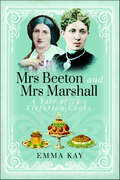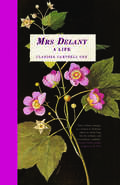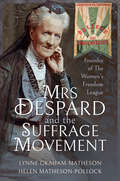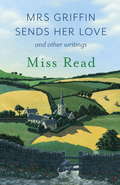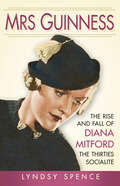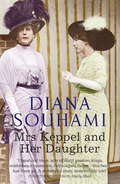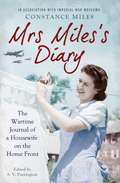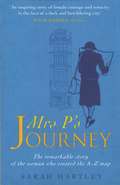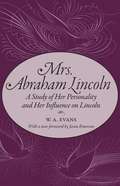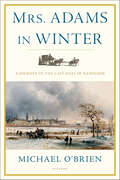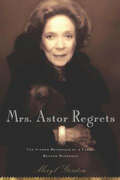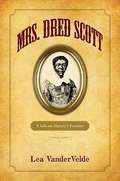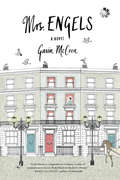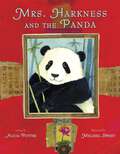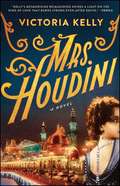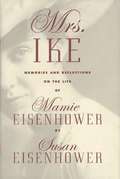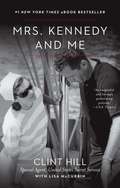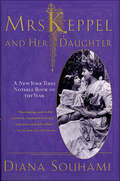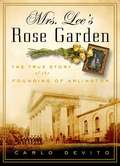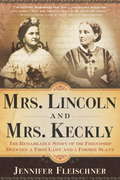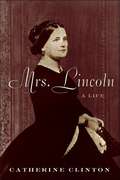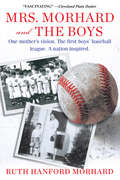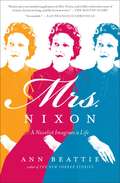- Table View
- List View
Mrs Beeton and Mrs Marshall: A Tale of Two Victorian Cooks
by Emma KayThe name Mrs Beeton has endured for well over a century, synonymous with all things reassuringly culinary, while her contemporary Agnes Bertha Marshall remains somewhat of an enigma. Both Isabella Beeton and Agnes Bertha Marshall lived within a short distance of each other in Pinner, worked in London, wrote about, and shared a passion for food, all just a couple of decades apart. While Isabella Beeton compiled one successful book of collected recipes, Agnes built a cookery empire, including a training school, the development of innovative kitchen equipment, a range of cooking ingredients, an employment agency and a successful weekly journal, as well as writing three incredibly popular recipe books. Mrs Beeton and Mrs Marshall: A Tale Of Two Victorian Cooks intrudes on the private lives of both these women, whose careers eclipsed two very different halves of the Victorian era. While there are similarities between the two, their narratives explore class and background, highlight the social and economic contrasts of the nineteenth century, the ascension of the cookery industry in general and the burgeoning power of suffragism.
Mrs Delany: A Life
by Clarissa Campbell OrrThe first comprehensive biography of Mary Granville Delany – the artist and court insider whose flower collages, in particular, continue to inspire widespread admiration Mrs Delany is best remembered for her captivating paper collages of flowers, but her artistic flourishing came late in life. This nuanced, deeply researched biography pulls back the lens to place Delany’s art in the broader context of her family life, relationships with royalty, and her endeavor to live as an independent woman. Clarissa Campbell Orr, a noted authority on the eighteenth century court, charts Mary Delany’s development from a young woman at the heart of elite circles to beloved godmother and celebrated collagist. Orr traces the varied connections Mary Delany fostered throughout her life and which influenced her intellectual and artistic development: she was friends with prominent figures such as Methodist leader, John Wesley, composer G. F. Handel, the writer Jonathan Swift, and England’s leading patron of science, Margaret Bentinck, Duchess of Portland. Mrs Delany reveals its subject to be far more than a widow befriended by George III and Queen Charlotte; she is, instead, restored to her proper place in the era’s aristocratic society –and as a ground-breaking artist.
Mrs Despard and the Suffrage Movement: Founder of The Women's Freedom League (Trailblazing Women Ser.)
by Lynne Graham-Matheson Helen Matheson-PollockThe biography of an activist who dedicated her long life to standing up for women, children, and the poor.Charlotte Despard, social reformer and suffragette, was always known as Mrs Despard, never Charlotte. Her name should be as familiar to historians as those of Emmeline Pankhurst and Millicent Fawcett—yet she remains overlooked.Born in 1844, she found solace in literature during a difficult childhood, identifying with Milton’s Satan and the romantic words of Shelley. She married Maximillian Despard and had the opportunity to explore the world and try her hand at a career as a novelist. When she was widowed in her early forties, her money and status allowed her to live a life of surprising freedom for a woman of her time. She used it to improve the lot of the poor—and moved to live among them in the London slums. She fought for better living and working conditions for all, supporting adult suffrage before becoming involved in the fight for votes for women. She joined Emmeline Pankhurst’s Women’s Social and Political Union and, when that organization split in 1907, co-founded the Women’s Freedom League, becoming its first, and much loved, president. She also served as editor of its newspaper, The Vote. When suffrage activities were largely suspended after the outbreak of WW1 in 1914, she returned to her Irish roots and moved to Dublin to support the fight for Irish home rule. After some women were enfranchised in 1918, she even tried running for Parliament. And though she died penniless at ninety-five—having given all her money to helping those less fortunate—her quiet legacy is felt to this day in causes supporting the rights of women and children.
Mrs Despard and the Suffrage Movement: Founder of The Women's Freedom League (Trailblazing Women Ser.)
by Lynne Graham-Matheson Helen Matheson-PollockThe biography of an activist who dedicated her long life to standing up for women, children, and the poor.Charlotte Despard, social reformer and suffragette, was always known as Mrs Despard, never Charlotte. Her name should be as familiar to historians as those of Emmeline Pankhurst and Millicent Fawcett—yet she remains overlooked.Born in 1844, she found solace in literature during a difficult childhood, identifying with Milton’s Satan and the romantic words of Shelley. She married Maximillian Despard and had the opportunity to explore the world and try her hand at a career as a novelist. When she was widowed in her early forties, her money and status allowed her to live a life of surprising freedom for a woman of her time. She used it to improve the lot of the poor—and moved to live among them in the London slums. She fought for better living and working conditions for all, supporting adult suffrage before becoming involved in the fight for votes for women. She joined Emmeline Pankhurst’s Women’s Social and Political Union and, when that organization split in 1907, co-founded the Women’s Freedom League, becoming its first, and much loved, president. She also served as editor of its newspaper, The Vote. When suffrage activities were largely suspended after the outbreak of WW1 in 1914, she returned to her Irish roots and moved to Dublin to support the fight for Irish home rule. After some women were enfranchised in 1918, she even tried running for Parliament. And though she died penniless at ninety-five—having given all her money to helping those less fortunate—her quiet legacy is felt to this day in causes supporting the rights of women and children.
Mrs Griffin Sends Her Love: and other writings
by Miss ReadA nostalgic collection on rural schools, childhood and English country life from the much-loved author of VILLAGE SCHOOL.From organising the school summer fete...'Because of our inability to recognise our climatic shortcomings from the outset, arrangements for outdoor jollities get completely out of hand'....to the sometimes rather odd passions of childhood:'I collect stones with holes in them'.Miss Read captures the essence of rural life, and in particular of village schools, as only she can. This collection also includes extracts from her letters:'Michael Joseph wrote after the Observer thing and is throwing out feelers for a book. I shall know if he still feels like it - me too! - after we've met'.It will also include an Introduction on how 'Miss Read' was first created: 'Miss Read was born fully clothed in sensible garments and aged about forty. She was born, in fact, when I was struggling to write my first book and needed a village schoolmistress as the narrator.'
Mrs Guinness: The Rise and Fall of Diana Mitford, the Thirties Socialite
by Lyndsy SpenceBefore Diana Mitford's disgrace as a social pariah, she was a celebrated member of the Bright Young Things, moving at the centre of 1920s and '30s London high society. She was a muse to many: Helleu painted her, James Lees-Milne worshipped her, Evelyn Waugh dedicated a book to her and Winston Churchill nicknamed her 'Dina-mite'. As the young wife of Bryan Guinness, heir to the Guinness brewing empire, she lived a gilded life until fascist leader Sir Oswald Mosley turned her head. Unpublished letters, diaries and archives bring an unknown Diana to life, creating a portrait of a beautiful woman whose charm and personality enthralled all who met her, but the discourse of her life would ultimately act as a cautionary tale. This groundbreaking biography reveals the woman behind the myth.
Mrs Keppel and Her Daughter
by Diana SouhamiAlice Keppel, lover of Queen Victoria's son Edward VII and great-grandmother of Camilla Parker-Bowles, was the acceptable face of Edwardian adultery. It was her art to be the King's mistress yet to laud the Royal Family and the institution of marriage. She partnered the King for yachting at Cowes and helped him choose presents for his wife Queen Alexandra while remaining calmly married to her complaisant husband George. But for her daughter Violet, passionately in love with Vita Sackville-West, romance proved tragic and destructive. Mrs Keppel used all the force at her command to repress the relationship. This fascinating and intense mother-daughter relationship highlights Edwardian and contemporary duplicity and double standards. It goes to the heart of questions about the monarchy, family values and sexual freedoms.
Mrs Miles's Diary
by S. V. PartingtonAt the outbreak of the Second World War Constance Miles was living with her husband in the pretty Surrey village of Shere. A prolific correspondent with a keen interest in current affairs, Constance kept a war journal from 1939 to 1943, recording in vivid detail what life was like for women on the Home Front.She writes of the impact of evacuees, of food shortages and the creative uses of what food there was, and the fears of the local populace, who wonder how they will cope. She tells of refugees from central Europe billeted in village houses and, later in the war, of the influx of American servicemen. She travels frequently to London, mourning the destruction of familiar landmarks and recording the devastation of the Blitz, but still finds time for tea in the Strand. A woman of strong convictions, Mrs Miles is not afraid to voice her opinion on public figures and her worries about the social upheavals she feels certain to follow the war. But most of all her journals record an overlooked aspect of the conflict: the impact on communities outside of major cities, who endured hardships we find hard to imagine today. It is a fascinating document that makes for compulsive reading.
Mrs Miles's Diary: The Wartime Journal of a Housewife on the Home Front
by S. V. Partington Constance MilesAt the outbreak of the Second World War Constance Miles was living with her husband in the pretty Surrey village of Shere. A prolific correspondent with a keen interest in current affairs, Constance kept a war journal from 1939 to 1943, recording in vivid detail what life was like for women on the Home Front. She writes of the impact of evacuees, of food shortages and the creative uses of what food there was, and the fears of the local populace, who wonder how they will cope. She tells of refugees from central Europe billeted in village houses and, later in the war, of the influx of American servicemen. She travels frequently to London, mourning the destruction of familiar landmarks and recording the devastation of the Blitz, but still finds time for tea in the Strand. A woman of strong convictions, Mrs Miles is not afraid to voice her opinion on public figures and her worries about the social upheavals she feels certain to follow the war. But most of all her journals record an overlooked aspect of the conflict: the impact on communities outside of major cities, who endured hardships we find hard to imagine today. It is a fascinating document that makes for compulsive reading.
Mrs P's Journey: The Remarkable Story Of The Woman Who Created The A-z Map
by Sarah HartleyMRS P'S JOURNEY is the enchanting story of Phyllis Pearsall. Born Phyllis Isobella Gross, her lifelong nickname was PIG. The artist daughter of a flamboyant Hungarian Jewish immigrant, and an Irish Italian mother, her bizarre and often traumatic childhood did not restrain her from becoming one of Britain's most intriguing entrepreneurs and self-made millionaires. After an unsatisfactory marriage, Phyllis, a thirty-year-old divorcee, had to support herself and so became a portrait painter. It is doing this job and trying to find her patron's houses that Phyllis became increasingly frustrated at the lack of proper maps of London. Instead of just cursing the fact as many fellow Londoners probably did, Phyllis decided to do something about it. Without hesitation she covered London's 23,000 streets on foot during the course of one year, often leaving her Horseferry Road bedsit at dawn to do so. To publish the map, and in light of its enormous success, she sets up her own company, The Geographer's Trust, which still publishes the London A-Z and that of every major British city. MRS P'S JOURNEY is the account of a strong, independent woman who has left behind an enduring legacy.
Mrs. Abraham Lincoln: A Study of Her Personality and Her Influence on Lincoln
by W. A. EvansFirst published in 1932, this was the first thoroughly researched biography of Mary Lincoln ever written, and it remains the most balanced and complete work on this controversial First Lady. Author W. A. Evans challenges the disparaging views of Mary Lincoln that were generally accepted at the time, offering a comprehensive and informed look at a woman whose physical and mental health problems have often been misconstrued or overlooked by other biographers. Evans conducted extensive research, interviewing Mrs. Lincoln's family members, seeking advice and assistance from numerous Lincoln scholars and historians, scouring thousands of pages of contemporary newspapers and primary resources, reviewing correspondence Mary wrote during her stay at Bellevue Place sanitarium, and consulting with several medical experts. The result of all this research is an objective and detailed portrait of Mrs. Lincoln and her influence on her husband that still has a great deal of historical value for readers today. A new foreword by Jason Emerson, author of The Madness of Mary Lincoln, provides biographical information on Evans and background on the origins of the book and its reception and influence. Finally back in print, this classic biography is essential reading for all with an interest in the Lincoln family.
Mrs. Adams in Winter: A Journey in the Last Days of Napoleon
by Michael O'BrienEarly in 1815, Louisa Catherine Adams and her young son left St. Petersburg in a heavy Russian carriage and set out on a difficult journey to meet her husband, John Quincy Adams, in Paris. She traveled through the snows of eastern Europe, down the Baltic coast to Prussia, across the battlefields of Germany, and into a France then experiencing the tumultuous events of Napoleon's return from Elba. Along the way, she learned what the long years of Napoleon's wars had done to Europe, what her old friends in the royal court in Berlin had experienced during the French occupation, how it felt to have her life threatened by reckless soldiers, and how to manage fear.The journey was a metaphor for a life spent crossing borders: born in London in 1775, she had grown up partly in France, and in 1797 had married into the most famous of American political dynasties and become the daughter-in-law of John and Abigail Adams.The prizewinning historian Michael O'Brien reconstructs for the first time Louisa Adams's extraordinary passage. An evocative history of the experience of travel in the days of carriages and kings, Mrs. Adams in Winter offers a moving portrait of a lady, her difficult marriage, and her conflicted sense of what it meant to be a woman caught between worlds.
Mrs. Astor Regrets: The Hidden Betrayals of a Family Beyond Reproach
by Meryl GordonA biography that looks behind the headlines, and the gates of the house of Astor, as the famous family falls apart in public.The fate of Brooke Astor, the endearing philanthropist with the storied name, has generated worldwide headlines since her grandson Philip sued his father in 2006, alleging mistreatment of Brooke. And shortly after her death in 2007, Anthony Marshall, Mrs. Astor&’s only child, was indicted on charges of looting her estate. Rarely has there been a story with such an appealing heroine, conjuring up a world so nearly forgotten: a realm of lavish wealth and secrets of the sort that have engaged Americans from the era of Edith Wharton to the more recent days of Truman Capote.New York journalist Meryl Gordon has interviewed not only the elite of Brooke Astor&’s social circle, but also the large staff who cosseted and cared for Mrs. Astor during her declining years. The result is the behind-the-headlines story of the Astor empire&’s unraveling, filled with never-before-reported scenes. This powerful, poignant saga takes the reader inside the gilded gates of an American dynasty to tell of three generations&’ worth of longing and missed opportunities. Even in this territory of privilege, no riches can put things right once they&’ve been torn asunder. Here is an American epic of the bonds of money, morality, and social position.Updated with new material from inside the Brooke Astor TrialUSA Today&“An even-handed and fascinating portrait of a wealthy family torn apart by money, jealousy, and emotional distance.&”—&“If the tabloids are your morning cup of tea, this is your book.&”—New York Times Book Review
Mrs. Dred Scott: A Life on Slavery's Frontier
by Lea VanderVeldeAmong the most infamous U.S. Supreme Court decisions is Dred Scott v. Sandford . Despite the case's signal importance as a turning point in America's history, the lives of the slave litigants have receded to the margins of the record, as conventional accounts have focused on the case's judges and lawyers. In telling the life of Harriet, Dred's wife and co-litigant in the case, this book provides a compensatory history to the generations of work that missed key sources only recently brought to light. Moreover, it gives insight into the reasons and ways that slaves used the courts to establish their freedom. <P><P>A remarkable piece of historical detective work, Mrs. Dred Scott chronicles Harriet's life from her adolescence on the 1830s Minnesota-Wisconsin frontier, to slavery-era St. Louis, through the eleven years of legal wrangling that ended with the high court's notorious decision. The book not only recovers her story, but also reveals that Harriet may well have been the lynchpin in this pivotal episode in American legal history. <P><P>Reconstructing Harriet Scott's life through innovative readings of journals, military records, court dockets, and even frontier store ledgers, VanderVelde offers a stunningly detailed account that is at once a rich portrait of slave life, an engrossing legal drama, and a provocative reassessment of a central event in U.S. constitutional history. More than a biography, the book is a deep social history that freshly illuminates some of the major issues confronting antebellum America, including the status of women, slaves, Free Blacks, and Native Americans.
Mrs. Engels: A Novel
by Gavin Mccrea"Richly imagined."-starred review, Publishers Weekly"Grabs the reader from the first sentence and doesn't let go. . . Who knew reading about communists could be so much fun?"-starred review, Kirkus ReviewsLonglisted for The Guardian 2015 First Book AwardVery little is known about Lizzie Burns, the illiterate Irishwoman and longtime lover of Frederick Engels, coauthor of The Communist Manifesto. In Gavin McCrea's first novel, the unsung Lizzie is finally given a voice that won't be forgotten.Lizzie is a poor worker in the Manchester, England, mill that Frederick owns. When they move to London to be closer to Karl Marx and family, she must learn to navigate the complex landscapes of Victorian society. We are privy to Lizzie's intimate, wry views on Marx and Engels's mission to spur revolution among the working classes, and to her ambivalence toward her newly luxurious circumstances. Lizzie is haunted by her first love (a revolutionary Irishman), burdened by a sense of duty to right past mistakes, and torn between a desire for independence and the pragmatic need to be cared for.Yet despite or because of their profound differences, Lizzie and Frederick remain drawn to each other in this complex, high-spirited love story.
Mrs. Harkness and the Panda
by Alicia PotterIn 1934, Ruth Harkness had never seen a panda bear. Not many people in the world had.But soon the young Mrs. Harkness would inherit an expedition from her explorer husband: the hunt for a panda. She knew that bringing back a panda would be hard. Impossible, even. But she intended to try.So she went to China, where she found a guide, built traps, gathered supplies, and had explorers' clothes made—unheard of for a woman in those days. Then she set out up the Yangtze River and into the wilderness. What she discovered would awe America: an adorable baby panda she named Su Lin, which means "a little bit of something very cute."With breathtaking illustrations from Caldecott Honor artist Melissa Sweet, this little-known true story shares the tale of an adventurous woman who was bold and brave—and the unforgettable journey that helped shape American attitudes toward wildlife.
Mrs. Houdini
by Victoria Kelly"Kelly's mesmerizing reimagining shines a light on the kind of love that burns strong even after death." --People "A richly lyrical and thought-provoking novel with closing twists that feel as impossible, inevitable, and satisfying--as magical, in short--as one of Houdini's own illusions." --Publishers Weekly (starred review)Before escape artist Harry Houdini died, he vowed he would find a way to speak to his beloved wife Bess from beyond the grave using a coded message known only to the two of them. When a widowed Bess begins seeing this code in seemingly impossible places, it becomes clear that Harry has an urgent message to convey. Unlocking the puzzle will set Bess on a course back through the pair's extraordinary romance, which swept the illusionist and his bride from the beaches of Coney Island, to the palaces of Budapest, to the back lots of Hollywood. When the mystery finally leads Bess to the doorstep of a mysterious young photographer, she realizes that her husband's magic may have been more than just illusion. In surprising turns that weave through the uncertain days of the dawn of the twentieth century and continue into the dazzling 1920s, Mrs. Houdini is a thrilling tale that will take you deep into the heart of one of history's greatest love stories--asking what drives people to believe in something bigger than themselves--even as it reveals the famous magician's most remarkable feat of all.
Mrs. Ike: Memories and Reflections on the Life of Mamie Eisenhower
by Susan EisenhowerSusan Eisenhower looks back on the life of her grandmother in a tribute that coincides with the centenary of Mamie Eisenhower's birth. In this compelling biography of an army captain's wife who becomes First Lady, she paints the portrait of an independent, headstrong woman who was passionately engaged in a lifelong relationship with a man who was her utter opposite. Although their fifty-three-year marriage was ultimately marked by public triumph and private contentedness, their lives together were not always easy. On army posts all over America, in Panama and the Philippines, in Paris and Washington, Mamie Eisenhower struggled to find her way in a military system that took dedication and self-sacrifice for granted--just as she worked to keep her marriage on an even keel after the death of their first child, during debilitating illnesses, and in the midst of painful isolation when her husband was absorbed by work or committed to the battlefield. Yet as her granddaughter knew well, she radiated optimism, though people rarely recognized the discipline and fortitude behind her cheerfulness and her apparently effortless courtesy.
Mrs. Kennedy and Me: An Intimate Memoir
by Clint Hill Lisa MccubbinThe #1 New York Times bestselling memoir by Clint Hill that Kirkus Reviews called “clear and honest prose free from salaciousness and gossip,” Jackie Kennedy’s personal Secret Service agent details his very close relationship with the First Lady during the four years leading up to and following President John F. Kennedy’s tragic assassination.In those four years, Hill was by Mrs. Kennedy’s side for some of the happiest moments as well as the darkest. He was there for the birth of John, Jr. on November 25, 1960, as well as for the birth and sudden death of Patrick Bouvier Kennedy on August 8, 1963. Three and a half months later, the unthinkable happened.Forty-seven years after the assassination of President John F. Kennedy, the one vivid image that never leaves Clint Hill’s mind is that of President Kennedy’s head lying on Mrs. Kennedy’s lap in the back seat of the limousine, his eyes fixed, blood splattered all over the back of the car, Mrs. Kennedy, and Hill as well. Sprawled on the trunk of the car as it sped away from Dealey Plaza, Hill clung to the sides of the car, his feet wedged in so his body was as high as possible. Clint Hill jumped on the car too late to save the president, but all he knew after that first shot was that if more shots were coming, the bullets had to hit him instead of the First Lady. Mrs. Kennedy’s strength, class, and dignity over those tragic four days in November 1963 held the country together.This is the story, told for the first time, of the man who perhaps held her together.
Mrs. Keppel and Her Daughter: A Biography
by Diana SouhamiAlice Keppel, the married lover of Queen Victoria's eldest son and great-grandmother to Camilla Parker-Bowles, was a key figure in Edwardian society. Hers was the acceptable face of adultery. Discretion was her hallmark. It was her art to be the king's mistress and yet to laud the Royal Family and the institution of marriage. Formidable and manipulative, her attentions to the king brought her wealth, power, and status. Her daughter Violet Trefusis had a long tempestuous affair with the author and aristocrat Vita Sackville-West, during which Vita left her husband and two sons to travel abroad with Violet. It was a liaison that threatened the fabric of Violet's social world, and her passion and recalcitrance in pursuit of it pitted her against her mother and society. From memoirs, diaries, and letters, Diana Souhami portrays this fascinating and intense mother/daughter relationship in Mrs. Keppel and Her Daughter. Her story of these women, their lovers, and their lovers' mothers, highlights Edwardian - and contemporary - duplicity and double standards and goes to the heart of questions about sexual freedoms.
Mrs. Lee's Rose Garden
by Carlo DevitoMrs. Lee's Rose Garden is an intimate retelling of Arlington National Cemetery's tragic beginnings, and sheds new light on this profound chapter in American history.Mrs. Lee's Rose Garden is the intensely personal story of Arlington National Cemetery's earliest history as seen through the lives of three people during the outbreak of the Civil War: Mary Ann Randolph Custis Lee, Robert E. Lee, and Montgomery C. Meigs. With all the majesty and pathos of a Greek tragedy, this story unfolds as the war's inevitable spiral of betrayal, tragedy, loss, and death begins, ultimately transforming the nation's most famous country estate into its most sacred ground. In the years before the war, the Arlington estate sat like an American Acropolis towering above Washington. Mary Custis Lee was known as the Rose of Arlington, a brash, young, willful, and charming young woman, indulged by her famous father, George Washington Parke Custis, the grandson of George Washington. Artistic, well read, and highly intelligent, she was an avid gardener who spent as much time as possible tending the numerous flowerbeds of the Arlington Mansion, along with her mother and her three daughters. Handsome and dashing, Robert E. Lee was easily the most promising soldier of his generation. But long before he was a field commander he was also a great success in the Army Corps of Engineers, having worked on major projects around the U.S. His friend, Montgomery C. Meigs, who had served under Robert, was a scion of Philadelphia society, and rose to become the engineer responsible for helping to complete the capital, and one of the most accomplished builders of his generation. When the time for war arose, Lee refused the opportunity to head the Union Army. He could not draw his sword against his own state, his own people, and instead accepted a commission in the Confederate Army, pitting himself against many of his old comrades. Thus began a series of events that would ultimately pit these three against each other.
Mrs. Lincoln and Mrs. Keckly
by Jennifer FleischnerA vibrant social history set against the backdrop of the Antebellum south and the Civil War that recreates the lives and friendship of two exceptional women: First Lady Mary Todd Lincoln and her mulatto dressmaker, Elizabeth Keckly. “I consider you my best living friend,” Mary Lincoln wrote to Elizabeth Keckly in 1867, and indeed theirs was a close, if tumultuous, relationship. Born into slavery, mulatto Elizabeth Keckly was Mary Lincoln’s dressmaker, confidante, and mainstay during the difficult years that the Lincolns occupied the White House and the early years of Mary’s widowhood. But she was a fascinating woman in her own right, independent and already well-established as the dressmaker to the Washington elite when she was first hired by Mary Lincoln upon her arrival in the nation’s capital. Lizzy had bought her freedom in 1855 and come to Washington determined to make a life for herself as a free black, and she soon had Washington correspondents reporting that “stately carriages stand before her door, whose haughty owners sit before Lizzy docile as lambs while she tells them what to wear. ” Mary Lincoln had hired Lizzy in part because she was considered a “high society” seamstress and Mary, an outsider in Washington’s social circles, was desperate for social cachet. With her husband struggling to keep the nation together, Mary turned increasingly to her seamstress for companionship, support, and advice—and over the course of those trying years, Lizzy Keckly became her confidante and closest friend. WithMrs. Lincoln and Mrs. Keckly, pioneering historian Jennifer Fleischner allows us to glimpse the intimate dynamics of this unusual friendship for the first time, and traces the pivotal events that enabled these two women—one born to be a mistress, the other to be a slave—to forge such an unlikely bond at a time when relations between blacks and whites were tearing the nation apart. Beginning with their respective childhoods in the slaveholding states of Virginia and Kentucky, their story takes us through the years of tragic Civil War, the assassination of Abraham Lincoln, and the early Reconstruction period. An author in her own right, Keckly wrote one of the most detailed biographies of Mary Lincoln ever published, and though it led to a bitter feud between the friends, it is one of the many rich resources that have enhanced Fleischner’s trove of original findings. A remarkable, riveting work of scholarship that reveals the legacy of slavery and sheds new light on the Lincoln White House,Mrs. Lincoln and Mrs. Kecklybrings to life a mesmerizing, intimate aspect of Civil War history, and underscores the inseparability of black and white in our nation’s heritage. From the Hardcover edition.
Mrs. Lincoln: A Life
by Catherine ClintonAbraham Lincoln is the most revered president in American history, but the woman at the center of his life, his wife, Mary, has remained a historical enigma. In this definitive, magisterial biography, Catherine Clinton draws on important new research to illuminate the remarkable life of Mary Lincoln, and at a time when the nation was being tested as never before. Mary Lincoln's story is inextricably tied with the story of America and with her husband's presidency, yet her life is an extraordinary chronicle on its own. Born into an aristocratic Kentucky family, she was an educated, well-connected Southern daughter, and when she married a Springfield lawyer she became a Northern wife--an experience mirrored by thousands of her countrywomen. The Lincolns endured many personal setbacks--including the death of a child and defeats in two U.S. Senate races--along the road to the White House. Mrs. Lincoln herself suffered scorching press attacks, but remained faithful to the Union and her wartime husband. She was also the first presidential wife known as the "First Lady," and it was in this role that she gained her lasting fame. The assassination of her husband haunted her for the rest of her life. Her disintegrating downward spiral resulted in a brief but traumatizing involuntary incarceration in an asylum and exile in Europe during her later years. One of the most tragic and mysterious of nineteenth-century figures, Mary Lincoln and her story symbolize the pain and loss of Civil War America. Authoritative and utterly engrossing, Mrs. Lincoln is the long-awaited portrait of the woman who so richly contributed to Lincoln's life and legacy.
Mrs. Morhard and the Boys: One mother's vision. The first boys' baseball league. A nation inspired.
by Ruth Hanford MorhardThe loving biography of a dedicated mother in Cleveland, Ohio, who started America&’s first boys&’ baseball league during the Great Depression. At twelve years old, Josephine Morhard left her family's Pennsylvania farm to start a new life. After settling in Cleveland, she survived two bad marriages and became a single mother to two young children. When her spirited son started getting into trouble, she came up with a novel plan to give him the structure and sense of purpose he needed. Out of a dream, an empty lot, and the enthusiasm of other neighborhood kids, Josephine established the first boys&’ baseball league in America. Beyond all expectations, the Cleveland Indians rallied behind her project. Future baseball legends Bob Feller, Jeff Heath, and Roy Weatherly helped hone the boys&’ skills; renowned sports reporter Hal Lebovitz pitched in as an umpire; and they were even allowed to play in historic League Park. As Josephine&’s Little Indians graduated into the Junior American and Junior National Leagues, and finally a Little World Series, she helped them develop strong values and a sense of accomplishment. Some of them, like Ray Lindquist and Jack Heinen, even made it to the Minor Leagues. Mrs. Morhard and the Boys tells the unforgettable story of her dedication and lasting legacy.
Mrs. Nixon
by Ann BeattieDazzlingly original, Ann Beattie's Mrs. Nixon is a riveting exploration of an elusive American icon and of the fiction writer's art. Pat Nixon remains one of our most mysterious and intriguing public figures, the only modern First Lady who never wrote a memoir. Beattie, like many of her generation, dismissed Richard Nixon's wife: "interchangeable with a Martian," she said. Decades later, she wonders what it must have been like to be married to such a spectacularly ambitious and catastrophically self-destructive man. Drawing on a wealth of sources from Life magazine to accounts by Nixon's daughter and his doctor to The Haldeman Diaries and Jonathan Schell's The Time of Illusion, Beattie reconstructs dozens of scenes in an attempt to see the world from Mrs. Nixon's point of view. Like Stephen King's On Writing, this fascinating and intimate account offers readers a rare glimpse into the imagination of a writer. Beattie, whose fiction Vanity Fair calls "irony-laced reports from the front line of the baby boomers' war with themselves," packs insight and humor into her examination of the First Couple with whom boomers came of age. Mrs. Nixon is a startlingly compelling and revelatory work.
